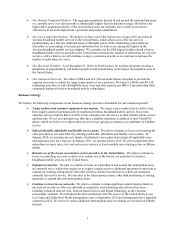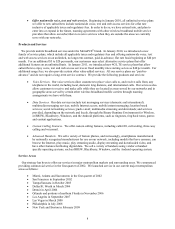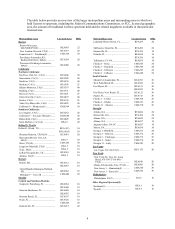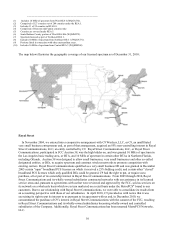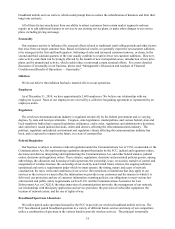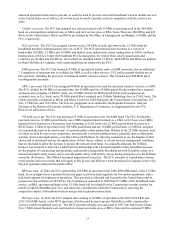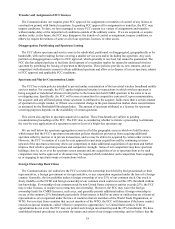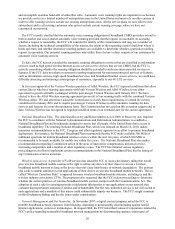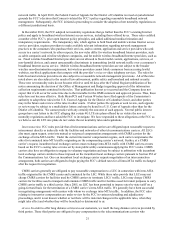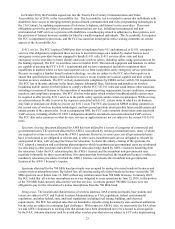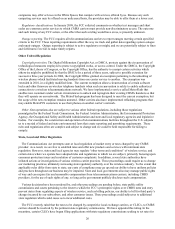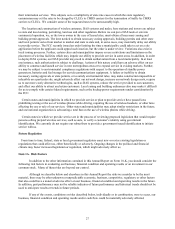Metro PCS 2010 Annual Report Download - page 27
Download and view the complete annual report
Please find page 27 of the 2010 Metro PCS annual report below. You can navigate through the pages in the report by either clicking on the pages listed below, or by using the keyword search tool below to find specific information within the annual report. 17
The FCC will award a renewal expectancy to broadband commercial mobile radio service, or CMRS, licensees if
the licensee meets specific performance standards. To receive a renewal expectancy, we must show that we have
provided substantial service during our past license term, and have substantially complied with applicable FCC rules
and policies and the Communications Act. If we receive a renewal expectancy, it is very likely that the FCC will
renew our existing licenses. If we do not receive a renewal expectancy, the FCC, in certain instances, may accept
competing applications for the license renewal period, subject to a comparative hearing, and may award the license
for the next term to another entity. The FCC also may deny license renewal applications for cause after appropriate
notice and hearing.
The FCC recently released an NPRM proposing to establish more consistent requirements for renewal of
licenses, uniform policies governing discontinuances of service, and to clarify certain construction obligations across
all of the wireless service bands. We are unable to predict with any certainty the likely timing or outcome of this
wireless renewal standards proceeding. The proposed changes to the applicable renewal and discontinuance of
service requirements may be applied to existing licenses that will be renewed in the future. If more stringent
requirements are applied retroactively to our existing licenses, the FCC may determine that prior actions or inactions
of ours, or of our predecessors in interest, jeopardize the renewal of our licenses. The FCC has not indicated when it
may take action on this NPRM.
Construction Obligations
The FCC has established various construction obligations for wireless licenses with different requirements often
applying to spectrum licensed at different points in time. For example, broadband PCS licensees holding licenses
originally granted as 30 MHz licenses must construct facilities to provide service covering one-third of the
population of the licensed area within five years, and two-thirds of the population of the licensed area within ten
years, or otherwise provide substantial service to the licensed area within the appropriate five- and ten-year
benchmarks of their initial license grant date. Broadband PCS licensees holding 10 MHz and 15 MHz licenses
generally must construct facilities to provide service to 25% of the licensed area within five years of their initial
license grant date, or otherwise make a showing of substantial service. The FCC defines substantial service as
service which is sound, favorable and substantially above a mediocre service level only minimally warranting
renewal. Either we, or our predecessor-in-interest for acquired licenses, satisfied the applicable five-year coverage
requirement for each of our broadband PCS licenses and the ten-year requirement for those PCS licenses that
already have been renewed. We also will be required to construct facilities to provide substantial service by the end
of the initial 15-year license term for our AWS licenses, or by November 2021.
The 700 MHz licenses are subject to more stringent performance requirements. To avoid any possible loss of
rights, we would need to provide wireless coverage to 35% of the geographic area of our licensed EA in four years,
or by June 2013, and 70% of the licensed geographic area by the end of the license term. While the FCC
occasionally has granted brief extensions to, and limited waivers of, license construction requirements, we cannot
expect any such relief to be granted in light of the Commission’s increased efforts to recapture unused spectrum due
to the broadband wireless spectrum shortage. As a consequence, any licensee failing to meet these coverage
requirements risks forfeiting their license and, in some cases, being subject to fines or monetary forfeitures.
The Commission also may adopt more stringent build-out requirements, impose further sanctions on licensees
which do not meet construction thresholds or create incentives for licensees to accelerate their build-out as a result
of the FCC’s concern over a shortage of needed broadband wireless spectrum. The FCC also could act on its NPRM
and impose more stringent renewal and discontinuance of service requirements, and apply those changes
retroactively to existing licenses that will be renewed in the future.
Revocation of Licenses
The FCC may deny applications for FCC licenses, deny renewal of FCC licenses, and revoke FCC licenses in
extreme cases where a licensee is found to lack the requisite qualifications to be a licensee. For example, the FCC
may revoke a license or deny an application of an entity found in a judicial or administrative proceeding to have
knowingly or repeatedly engaged in conduct involving felonies, possession or sale of illegal drugs, fraud, antitrust
violations or unfair competition, employment discrimination, misrepresentations to the FCC or other government
agencies, serious violations of the Communications Act or FCC regulations, or a failure to meet construction
obligations. If any FCC license of ours is denied or revoked for cause, this action may have an impact on our
ability to secure additional spectrum in the future, via auctions or through third party private transactions.


